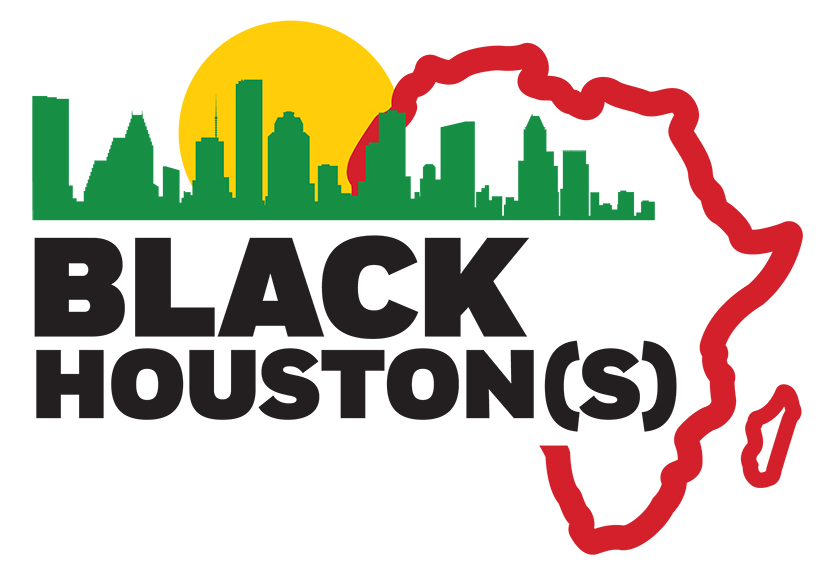Houston’s 1961 rebrand as ‘Space City, USA’ owes much to Rice University's historic research collaborations with NASA from the early months of the agency’s founding. Because of this partnership, ‘Houston’ will forever be the first human utterance broadcasted from the surface of the moon. Since then, ever-more ‘giant steps’ have been made both in terms of Houston-based STEM research as well as the popular cultural impact of H-Town’s historically unique forms of artistic expression. This seldom acknowledged intersection of critical STEM-based research and the Arts in Black Houston(s) calls attention to several questions: Precisely what forms of social life have Black communities negotiated and redefined, created and maintained in the context of uncertain technological and ecological futures? How do residents establish their sense of place in the city, and in what ways might Black Houstonian cultural productions continue to influence research innovations in ‘H-Town’s’ burgeoning healthcare and cultural industries?
Following the National Science Foundation’s definition, we approach the question of STEM broadly, to include research that spans the social sciences, welcoming research in such fields as sociology, anthropology, psychology and economics. To that end, Dark Matter: STEM & The Arts in Black Houston(s) will bring together researchers, scientists, artists, and scholar-activists at Rice and across metropolitan Houston whose work explores a number of emergent challenges posed by the community’s uncertain technological and environmental futures. Through this symposium, we aim to: (1) produce new knowledges related to Black Houston(s), and publish this information in an edited volume; and, (2) provide a platform for scholarly and community engagement and collaboration.
Thursday, March 27, 2025
AARHC - GREGORY CAMPUS
- Welcome (12:00 p.m.)
-
Sheena Wilson, Manager, Customer Experience, African American History Research Center - Gregory Campus
- Panel | Slow Deaths, Short Wakes: Standing in Houston’s Public Education Hurricane (12:10-1:10 p.m.)
-

Saron Regassa is a Public Policy senior at the University of Houston and founded the Houston Organization for Political Education (HOPE). Although originally coming to Houston for school, she has found a home here through her commitment to community building and advocacy. Saron has curated campus-wide archival displays of Black Houstonian history, worked for advocacy organizations like the ACLU of Texas, and won national titles for policy research competitions. She is inspired to study and practice the intersection between Black feminist frameworks and public policy in order to create more spaces with HOPE in the world.
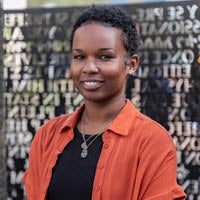
Andrea Tribble is an African American Studies scholar at the University of Houston and member of the Houston Organization for Political Education (HOPE). As a Mellon Research Scholar and student assistant in her university’s Special Collections department, Andrea is actively exploring how the archival record shapes historical scholarship, collective memory, and national identity—ultimately influencing how we understand ourselves and the communities around us. By analyzing how these records reflect the ongoing negotiation of power, identity, and resistance, Andrea aims to build a framework for using the archives not just as a repository of the past but as a guide for future action.
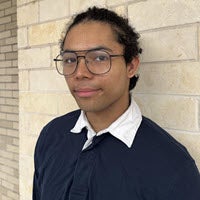
Milo Hewlett is a Political Science junior at the University of Houston and the Political Education Coordinator and Chief Editor of the Houston Organization for Political Education (HOPE). As a current Mellon Research Scholar, Milo is researching the ways pedagogical practices produce anti-Blackness in political science and philosophy classrooms. They first began this research as a member of the University of Houston’s policy research team, where they received awards for their contributions. Milo’s work is deeply informed by Black feminist and Black queer frameworks, which they use to guide students in critically engaging with political education. Their goal is to center Black scholarship as a foundational lens for understanding political and social realities, fostering a learning environment that challenges dominant narratives and cultivates radical thought.
Moderator: Ugochi Emenha, Associate Director, Rice Education
- BLACK HOUSTON(S) PACESETTER AWARD (1:20-2:00 p.m.)
-

Reagan Flowers, President and CEO of C-STEM Teacher and Student Support Services, Inc
- NETWORKING RECEPTION & LIVE ART (2:10-2:50 p.m.)
-
Artist | Ooowwee
- Panel | The Science of Antiracist Archaeology as a Tool to Un-Erase Houston’s Black Past (3:00-4:00 p.m.)
-

Intro to Antiracist Archaeology
Alicia Odewale (Ware) is an educator, African Diaspora Archaeologist, Restorative Justice advocate, and the founder of Archaeology Rewritten, an archaeological and educational consulting firm. As a National Geographic Explorer, she shares how both tangible and intangible Black heritage can be observed through the natural world using maps, objects, oral histories, archival records, sacred landscapes, and heritage trees. Dr. Odewale’s research focuses on African heritage sites in the U.S. and Caribbean, with an emphasis on community-centered, restorative justice, anti-racist, and Black feminist archaeology. She is a fierce advocate for the inclusion of archaeology in the classroom and in the history of Black heritage across the global diaspora. She has created two new courses at The University of Houston, “Finding Black Ancestors” and the new course that’s become a viral sensation “Before Cowboy Carter: Black Towns, Black Freedom” and. Dr. Odewale holds undergraduate degrees from Westminster College and advanced degrees from The University of Tulsa (TU). As a descendant of history makers that include soldiers, entrepreneurs, educators, farmers, doctors, and survivors from Black Towns such as Greenwood, OK “Black Wall Street” and Tuskegee, AL, she has made history herself as the first person of African descent to earn a PhD in anthropology from TU and later became the first Black faculty member in TU’s Anthropology Department.
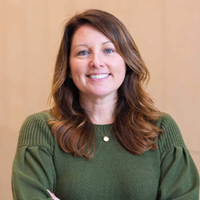
Molly Morgan is an archaeologist investigating the lives of captive laborers who lived and worked at 19th century plantations in Brazoria County, TX, in order to examine the historical context and legacies of slavery and how it is presented in public history. This work involves public archaeology through engagement with descendant communities and other local groups. She also offers experiential learning opportunities for undergraduate students in all parts of the process of archaeological and cultural heritage research.
An Introduction to Archaeology MOOC Grounded in Antiracist Archaeology
Kesia Knowles is an instructional designer at Rice Digital Learning, Rice University. She uses her expertise in digital humanities to integrate advanced technological tools, interactive digital resources, and innovative methodologies. Her goal is to enhance the educational experience and foster a deeper understanding of cultural and societal diversity. Leveraging nine years of experience as a high school English teacher, Kesia holds a graduate certificate in African American studies and a master's degree in Instructional Design and Technology. Currently, she is pursuing a PhD in Educational Design and Technology. Kesia's expertise lies in seamlessly integrating technology and education, evident in her adept design of online courses and instructional methods. Proficient in learning management systems like Canvas and Coursera, Kesia employs research-based learning theories to elevate the quality and effectiveness of her courses. She is committed to bridging the gap between technology and learning, providing valuable insights into instructional design strategies and web-based resources. Kesia creates cutting-edge technologies into the curriculum, creating a dynamic, student-centered learning environment. Her talent in digital humanities can be seen at the forefront of educational technology trends and incorporates innovative approaches that enrich the learning experience.
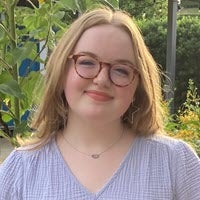
Mary Margaret Speed is a third-year undergraduates student at Rice University, studying Anthropology and minoring in Museums and Cultural Heritage. She is interested in North American archaeology, and hopes to become an archaeologist and museum professional in the future. She is also passionate about civic engagement, and is very involved in student government at Rice

Molly Morgan is an archaeologist investigating the lives of captive laborers who lived and worked at 19th century plantations in Brazoria County, TX, in order to examine the historical context and legacies of slavery and how it is presented in public history. This work involves public archaeology through engagement with descendant communities and other local groups. She also offers experiential learning opportunities for undergraduate students in all parts of the process of archaeological and cultural heritage research.
Curricula on Black Survivance and Resilience in Historically Black Towns

Alicia Odewale (Ware) is an educator, African Diaspora Archaeologist, Restorative Justice advocate, and the founder of Archaeology Rewritten, an archaeological and educational consulting firm. As a National Geographic Explorer, she shares how both tangible and intangible Black heritage can be observed through the natural world using maps, objects, oral histories, archival records, sacred landscapes, and heritage trees. Dr. Odewale’s research focuses on African heritage sites in the U.S. and Caribbean, with an emphasis on community-centered, restorative justice, anti-racist, and Black feminist archaeology. She is a fierce advocate for the inclusion of archaeology in the classroom and in the history of Black heritage across the global diaspora. She has created two new courses at The University of Houston, “Finding Black Ancestors” and the new course that’s become a viral sensation “Before Cowboy Carter: Black Towns, Black Freedom” and. Dr. Odewale holds undergraduate degrees from Westminster College and advanced degrees from The University of Tulsa (TU). As a descendant of history makers that include soldiers, entrepreneurs, educators, farmers, doctors, and survivors from Black Towns such as Greenwood, OK “Black Wall Street” and Tuskegee, AL, she has made history herself as the first person of African descent to earn a PhD in anthropology from TU and later became the first Black faculty member in TU’s Anthropology Department.
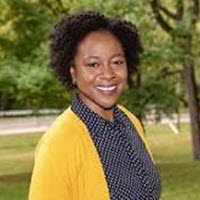
Khadene Harris is an Assistant Professor of Anthropology also appointed to the Center for African and African American Studies at Rice University. A historical archaeologist, her research explores the intersection of race, slavery, and capitalism in the Caribbean. Her current project focuses on the transition from slavery to freedom on the island of Dominica, with special emphasis on the social and economic networks of the laboring class. Her research uses imported and locally made ceramics, the house and yard complex, and oral accounts to narrate community histories under colonial rule.
Khadene has been a longtime collaborator with the Digital Archaeological Archive of Comparative Slavery (daacs.org). She has held fellowships with the International Center for Jefferson Studies and the Nielsen Center for the Liberal Arts.The Power of Archaeology in Preserving the Legacies of Freedmen’s Town

Sharon Fletcher, Houston Freedmen’s Town Conservancy
The Role of Archaeology in the Preservation of Historic Black Cemeteries at the Evergreen Negro Cemetery in Houston

Lisa Jedkins is an advocate/philanthropist that believes in keeping African American history alive through the education of historic African American cemeteries. For 20+ years she has been project manager and volunteer coordinator to assist Project RESPECT with multiple cemetery restoration projects in the Houston and surrounding areas. She is current president of WHY NOT LEGACY AND HERITAGE 501c3 organization that mission is to become a “change agent” for the many historical abandoned cemeteries across the state of Texas. She has amassed a network of resources and key partnerships with individuals dedicated to sharing African American culture and history by telling the story of their ancestors. She believes in the power of the term "Sankofa", understanding that we must know who we are and where we have been to know where we are going. Lisa Jedkins is an author of book named “Forgotten No More, Restoring and Preserving Historical Abandoned Burial Grounds”.

Zanitra Wells is co-founder/Executive Director of Why Not Legacy and Heritage Inc. She is on the board of Archaeology Now a 501c3 organization that goes across the world telling the stories of historic places and times. She believes that Immersion in preservation of the past will encourage and promote mutual respect for diversity, thereby combating racial discrimination and fostering tolerance and creating an appreciation of cultural differences. She is a genealogist that teaches youth and families how to use technology to research their family trees and help build family legacies. Zanitra is an inspiring archaeologist that has done more than 2 digs over the last year. She also oversees the digs done at the Evergreen Negro Cemetery located in Houston, Texas.

Alicia Odewale (Ware) is an educator, African Diaspora Archaeologist, Restorative Justice advocate, and the founder of Archaeology Rewritten, an archaeological and educational consulting firm. As a National Geographic Explorer, she shares how both tangible and intangible Black heritage can be observed through the natural world using maps, objects, oral histories, archival records, sacred landscapes, and heritage trees. Dr. Odewale’s research focuses on African heritage sites in the U.S. and Caribbean, with an emphasis on community-centered, restorative justice, anti-racist, and Black feminist archaeology. She is a fierce advocate for the inclusion of archaeology in the classroom and in the history of Black heritage across the global diaspora. She has created two new courses at The University of Houston, “Finding Black Ancestors” and the new course that’s become a viral sensation “Before Cowboy Carter: Black Towns, Black Freedom” and. Dr. Odewale holds undergraduate degrees from Westminster College and advanced degrees from The University of Tulsa (TU). As a descendant of history makers that include soldiers, entrepreneurs, educators, farmers, doctors, and survivors from Black Towns such as Greenwood, OK “Black Wall Street” and Tuskegee, AL, she has made history herself as the first person of African descent to earn a PhD in anthropology from TU and later became the first Black faculty member in TU’s Anthropology Department.
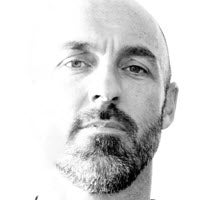
Keith E. McNeal is an Associate Professor of Anthropology in the Department of Comparative Cultural Studies at the University of Houston. He specializes in Caribbean ethnology and Black Atlantic history, with a focus on Trinidad and Tobago. His first book is Trance and Modernity in the Southern Caribbean: African and Hindu Popular Religions in Trinidad & Tobago (2015, University Press of Florida) and he is currently finishing two other book projects—Queering the Citizen: Dispatches from Trinidad & Tobago and Cremating the Body Politic: Death and Diaspora in the Hindu Caribbean—in addition to his first documentary film, Burning Identity.
Moderator: Portia Hopkins, University Historian, Fondren Library, Rice University
- Panel | Public Art, Praxis & Possibilities (4:45-6:00 p.m.)
-

Digitizing Texas Southern University’s Artistic Treasures
Kamilah Davis is an intern for the University Museum at Texas Southern, as well as a current junior at Texas Southern University pursuing her B.A. in Art and Minor in Museum Studies. Her art specializes in acrylic paint, pastel, charcoal drawings, and sculpture. She works as part of Texas Southern's involvement in the Smithsonian HBCU History & Culture Access Consortium, a project that is digitizing and making the University Museum's, Art Department’s, and Dr.John Biggers’ legacy more widely accessible. She plans to expand her education and receive her M.A. in museum studies and to pursue a career as a museum curator and archivist
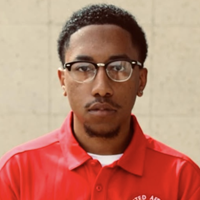
Ken Jackson is currently a third-year art major and museum studies minor at Texas Southern University. Jackson’s passion for art and history has led him to an exciting internship with the HCAC under the Smithsonian, where he is gaining invaluable experience in the field. In his spare time, he loves immersing himself in creative activities such as reading, painting, and writing. Jackson also cherishes the moments he spends with his frat brothers, enjoying quality time and building lifelong friendships. Jackson’s goal is to continue exploring the intersections of art and history, and to contribute to the preservation and appreciation of cultural heritage.
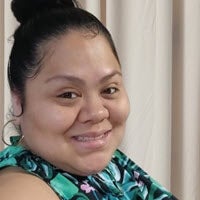
Rita Reyes is a visual artist and art researcher from Houston, Texas. She is currently the Smithsonian graduate fellow at the University Museum at Texas Southern University. Reyes's artwork highlights themes of Latin culture and family with the use of vibrant colors in her palette. Her work at the museum includes research focused on TSU’s permanent art collection, conducting oral histories and museum programming. Currently, she is pursuing her Masters in MLIS with a concentration on archives at Louisiana State University.

Ben Schachter is the Digital Humanities Program Manager at the University Museum at Texas Southern. Schachter received his B.A. in History and Latin American Studies from Rice University. His previous experience includes several archival and digital humanities projects, primarily focused on the study of the history of slavery in Texas, the US South, and the Caribbean. These include an undergraduate thesis on an enslaved family in Fort Bend County and work on the SlaveVoyages database. In his current role, he is tasked with managing Texas Southern’s participation in the Smithsonian HBCU History & Culture Access Consortium, a project which aims to digitize and promote the University Museum’s holdings to a broader audience. He is currently a candidate for a Master’s in Library Sciences from the University of North Texas.
From STEM to STEAM: A Study of Outcomes from Arts Integration into Science, Technology, Engineering and Math Through the HISD School System and Community Organizations in Houston in the Late 20th Century
April M. Frazier is an artist and photographer from Houston, Texas. She is a graduate of Prairie View A&M University, and Rice University. She formerly spent 15 years in technology oil and gas and is now the Assistant Director of the Community Artists’ Collective. April’s most prized and ongoing photographic work involves research and documentation of her ancestral roots in Texas through the creation of imagery on lands with familial connection from the time of enslavement to present day. Her exhibition, Frame of Reference was a culmination of this work and received national acclaim from its initial showing at the Houston Museum of African American Culture with additional displays across the US and abroad. April enjoys contributing to research projects that broaden access to diverse historical narratives such as partnering with Getty Images to launch their Black History and Culture Collection, working with Rice University on their SlaveVoyages Redesign Project, and contributing writing to the critical anthology, Racial Discourse in American Literature
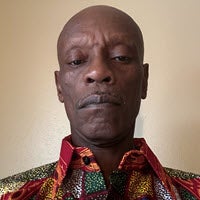
Bridging STEM and Black Cultural Production: Innovations in Economic, Social, and Artistic Development in Afro-Diasporic Houston
Ato Nyankom is a visionary leader in cultural entrepreneurship and community development, with a strong focus on the intersection of STEM and Black cultural production. As the Founder of Majestic Entertainment Group Africa America Foundation, he has spearheaded initiatives that empower youth, promote African and Afro-Diasporic arts, and drive economic innovation. His work bridges technology, business, and artistic expression, fostering sustainable development within Black communities.
With extensive experience in event organizing, Nyankom has curated international cultural festivals, business summits, and educational forums that highlight African heritage and entrepreneurship. His research interests center on the role of STEM in advancing economic opportunities and artistic innovation for underrepresented communities. He is committed to creating platforms that connect African and Diasporic voices, driving forward a vision of empowerment through education, technology, and cultural heritage.
Through his work, Nyankom continues to shape dialogues on economic and social progress in Afro-Diasporic spaces.
Moderator: Erika Thompson, Rice University Center for African and African American Studies (CAAAS
Friday, March 28, 2025
RICE UNIVERSITY - Moody Center for the Arts
- Welcome (12:00 p.m.)
-
Portia Hopkins, University Historian, Fondren Library, Rice University
- Panel | Digital Ancestors: the felt and seen (12:15-1:15 p.m.)
-
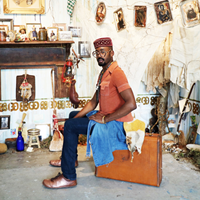
Viktor le Givens is a multimodal installation performance artist whose practice centers around the gathering and arrangement of ancestral objects to recontextualize the seemingly mundane into the spectacularly sacred. His material archive is comprised mostly of forgotten and discarded domestic items found during excavations of his family's East Texas estate. The ownership of that land dating back to 1866 when his great great great grandparents Lula Louise and Albert Burleson organized collective labor strategies to cultivate and barter 1500 pounds of cotton in exchange for an underutilized 20 acre parcel of land just outside of Houston, TX. Over subsequent generations their hard work and dedication matured into a 40-acre estate known as Givens Hill. Gathered atop “the Hill” lived handmade homes, social parlors, a baptismal pool, barbershop, and vegetable garden. Givens has examined the under-celebrated and largely forgotten technologies of agrarian Black cultural production in spaces such as shotgun houses, African American cemeteries, and the many types of nourishment provided in a simple piece of homemade cornbread, pot of stewing peas or simmering collard greens. His work is thorough, deep, interstitial, ever-evolving and refusing to stand still; continually looking and seeing what there is to be dreamed, felt and heard. By connecting the material culture of his ancestors with precolonial and postmodern spiritual philosophies, le. Givens activates his installations by treating them as living altars. As a descendant of educators, spiritual workers and social servants, Givens, believes his practice synthesizes the cultural technologies of these ancestral artifacts into contemporary platforms for reinvention.
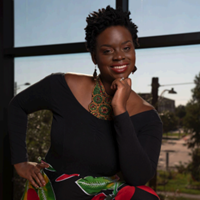
Stacey Allen is an award-winning dancemaker, curator, and advocate for arts education, equity, and reproductive justice. She is the Founder and Artistic Director of Nia’s Daughters Movement Collective and the author of A Little Optimism Goes a Long Way and D is for Dance: Dancing Through the Diaspora. She also created The Fairytale Project, a touring dance-theater piece inspired by Texas Freedom Colonies. Based in Houston, TX, she holds a BA in Dance and an MA in Cross-Cultural Studies. Her research interests include dance anthropology, material culture, and the intersections of movement and memory. Stacey is the Director of Artistic Programming at The Anderson Center for Arts and a consultant for the Outsider Preservation Initiative. Learn more at www.niasdaughters.com or on IG @theblackartsymom
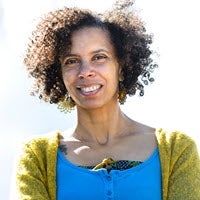
Dr. Adesola Akinleye is an artist-scholar whose choreographic work bridges art, technology, and social inquiry. Adesola draws out the connections between movement, identity, and environment, seeing dance as a profound mode of engagement, storytelling, and social action. Adesola is co-artistic director of DancingStrongMovementLab. and an Associate Professor at Texas Woman’s University and a former Fellow at the Center for Art, Science and Technology at MIT, and Theatrum Mundi.
Grounded in s Afro-Indigenous perspectives, Adesola explores dance as an embodied method for witnessing, remembering, and listening. Their work engages the relationship between physical Self and environment as a “living archive,” revealing the intricate relationships between movement, identity, and environment: Place. Central to Adesola’s practice is an urgent commitment to kinship across the web of human and non-human, that reflects principles inherent in many Afro-Indigenous worldviews.
Adesola’s publications include the monograph Dance, Architecture and Engineering, and Dancing Place: scores of the city, scores of the shore; commissions include site-specific work at The Hayward Gallery, London. Supported by the NEA, Adesola’s XR project, Space+Digital+Dance, uses augmented reality to craft new, communal experiences that deepen the engagement between digital futures and embodied practice.
- Panel | AgriCULTURAL & Environmental Futures (1:30-2:15 p.m.)
-
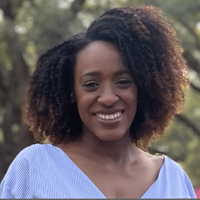
Sunnyside Strong: The Effects of Environmental Racism in South Houston
V. Celina Silva research focuses on Afro-Cuba's history within the 1960s Modern Revolution, exploring the intersections of black identity, political movements, and cultural expression. She has a Master of Arts degree in African Studies from Howard University. As a recipient of Howard University’s Foreign Language & Area Studies (FLAS) Fellowship and a member of the University of Houston’s Ankh Maat Wedjau Honor Society, she has studied interdisciplinary scholarship that examines the African diaspora’s historical and contemporary connections. Her work has been featured at the Howard University & University of Ghana Graduate Student Symposium, where she served as an orator for critical discussions on transnational black solidarity. She is committed to Pan-Africanism specifically in the Hispanophone and Anglophone Caribbean and is a proud Houston native.
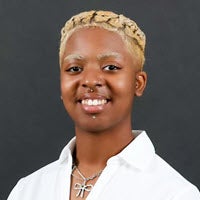
NextGen: Innovations in Agriculture and Technology Empowering the Leaders of Tomorrow
Alexis Brown is an Agriculture major with a minor in pre-veterinary medicine and chemistry at Prairie View A&M University. My research focuses on how K-12 students engage with STEM, agriculture, and sustainability to improve underserved communities. I am also interested in food sustainability and genetic modifications in commercial food products. I co-founded NextGEN, a club that extends my research by connecting with local schools through interactive STEM-based lesson plans. I recently attended the 21st Biennial 1890 Association of Research Directors’ Conference in Nashville, Tennessee, where I engaged with experts in agricultural and environmental research. Additionally, I serve on the E-Board for Kappa Omicron Nu, an honor society for human sciences. I aspire to become an exotic animal veterinarian and soon hope to conduct research on zoonotic diseases to better understand their impact on both animals and humans.
- Panel | Contemporary Artists’ Investigation of Afro-Surrealism, Afro-Materialities, and Collective Memory Within Historic Black Houston(s) (2:30-3:45 p.m.)
-
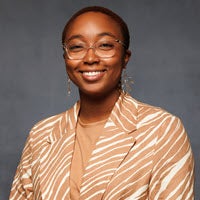
Zahrah Butler is the Registrar at the Texas Southern University Museum and a graduate of Rice University's Religion Department. Her scholarly work examines the legacies of enslavement present within the archives and cultural heritage sites of Southeast Texas, with particular attention to how these sites convey these complex histories to diverse audiences. Through her work at the University Museum, Zahrah has developed an interest in examining art as being in conversation with local Black histories to create new interpretations of reality, the world(s) we exist in, and the futures the Blackness can/will create. She is particularly interested in the approaches Black artists use as educators when helping students craft their own artistic philosophies and methods.
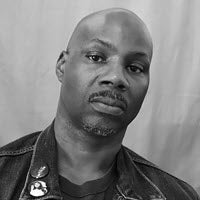
Nathaniel Donnett is a cultural practitioner whose practice shapes and holds
philosophical and psychological significance. His work is rooted in Black cultural expression, abstraction, the poetry of everyday aesthetics, vernacular architecture, and the lived experience.Donnett works across disciplines and engages with communities, fostering a practice that forges social relationships between art and life. Situating sociocultural concerns alongside more expansive themes like material imagination, Donnett explores notions of the enclosure, the in-between, and the cosmology of Black American phenomena and beyond, which he calls Dark Imaginarence. Dark Imaginarence is a neologism Donnett coined to describe his practice, methodology, and attempts to create new languages within and beyond the framework of art and culture. Nathaniel Donnett received his B.A. in Fine Arts from Texas Southern University and his MFA from Yale University School of Art. Nathaniel is the 2024-2025 recipient of the Mitchell Center Scholar in Residence in the School of Art, a 2024 American Academy of Rome Affiliate Fellow, and a 2022 John Simon Guggenheim Fellow. His work has been exhibited at The Contemporary Arts Museum Houston, The Virginia Museum of Contemporary Art, The Kemper Contemporary Arts Museum, and The University Museum, among others.

Texas native Anthony Suber is an interdisciplinary artist working and living in SouthEast Texas. He received a BFA from the University of Houston and completed his MFA at Houston Christian University. Throughout his career, Suber has exhibited work and produced multi-tiered activations both nationally and abroad. Suber is a professor of art with the Katherine G. McGovern College at University Houston’s School of Art and an artist-in-residence with Project Row Houses in Houston’s historic Third Ward community. He also serves as the Creative Director for the arts and mental health nonprofit, The Blackman Project.
Suber’s work has been exhibited at the Museum of Contemporary Art in Thessaloniki, Greece, Project Row Houses, Houston, Tinney Contemporary in Nashville, University Museum at Texas Southern University, Houston, Art is Bond Gallery, Houston, John B. Coleman Gallery at Prairie View A&M University, Houston Museum of African American Culture, with solo exhibitions at Red Bud Arts Center in Houston, LRT Gallery, Houston and Cindy Lisica Gallery, Houston. His work has been featured in publications such as Arts and Culture Texas, Glass Tire, The Houston Chronicle, and Free Press Houston. Suber was the recipient of the Artadia Art Prize in 2022.

Kaima Marie Akarue, the daughter of a Nigerian immigrant and a white mother, explores identity through collage, focusing on urbanism, capitalism, and erased narratives. Kaima constructs layered environments that challenge viewers to reflect on identity, memory, and the spaces we inhabit and often overlook. Her work preserves personal and collective histories, reimagining memory and place. She has exhibited nationally at institutions like the Museum of Fine Arts Houston and the Museum of Science and Industry in Chicago, earning accolades such as the 2024 Jones Artist Award and the Carol Crow Fellowship. She will receive her MFA from the University of Houston in Spring 2025.
- Panel | Black STEAM Pedagogies (4-5 p.m.)
-
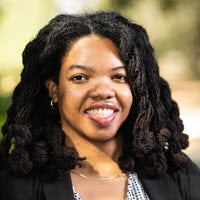
Afrochemistry: The study of Black-life matter
Dr. Brooke Johnson is an educator and chemist who currently serves as a preceptor (postdoctoral fellow) in the Chemistry Department and Office of Access and Institutional Excellence here at Rice University. Dr. Johnson is a Rice alum, graduating with a Bachelor's in Chemistry in 2017 before completing her PhD at Princeton University in the lab of Dr. Mohammed Seyedsayamdost in 2023. During her PhD, Dr. Johnson uncovered novel enzymatic reactions from natural product gene clusters found in the oral microbiome, a work that was published in the Journal of the American Chemical Society. During her doctoral work, Dr. Johnson also discovered her interest in African American studies. After returning to Rice, Dr. Johnson developed and taught a novel undergraduate course titled Afrochemistry: The Study of Black-Life Matter integrating introductory chemistry topics with their applied intersections with social justice and Black studies.Movement and Mind: The Role of Afro-Diasporic Dance in Facilitating Neurological Recovery and Advancing Trauma-Informed STEAM Curricula for Black Communities in Houston

Edith Ibeke is a junior from Duncan College majoring in Biosciences with a concentration in Cell Biology and Genetics and a minor in Theatre. She is a Joint Admission Medical Program Ambassador and does microbiology research at Rice. Outside of her science-related interests, she enjoys engaging in fine arts such as singing, acting, and dancing.
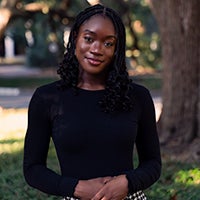
Mariam Falana is a junior at Rice University majoring in Cellular and Molecular Neurosciences with a certificate in civic leadership. My work bridges research, mentorship, community advocacy, and the arts. I explore the neurological inner workings of emotion regulation and investigate the historical narratives in Brazoria County, uncovering the lives and legacies of its communities. As a Peer Research Ambassador with the Office of Undergraduate Research and Inquiry (OURI), I support students in navigating their academic journeys. My civic leadership focuses on equity in arts education and amplifying minority voices in underserved spaces. Beyond research and advocacy, I direct for the Rice African Student Association (RASA) afro-dance team, AKOMA, serve as DAWA's Pre-Health Society's Publicity Coordinator, and train with Hosuton's dance teams and choreographers. In my free time, I indulge in reality TV, fashion, makeup, and deep dives into documentaries and horror films. Whether through storytelling, science, or movement, I'm passionate about the intersections of identity, history, and community.
Moderator: Hassan Henderson-Lott, Department of Religion PhD Program, Rice University
- PERFORMANCE | Words to Live By: A Tribute to Nikki Giovanni (5:30-6 p.m.)
-

A powerful dance performance that honors the life and legacy of the iconic poet, activist, and storyteller. Through movement and poetry, this performance weaves together Nikki Giovanni's profound words to reflect on the past, present, and future of her artistic journey. The dancers bring her poetry to life, exploring themes of freedom, love, resilience, and transformation. This tribute captures the spirit of Giovanni’s work, celebrating her impact on generations of artists and activists. A poignant and soulful exploration of her enduring influence, "Words to Live By" invites the audience to reflect on how we can live her truths in our own time.
Pictured: Harrison Guy & Urban Souls Dance Company
- KEYNOTE | Dark Matter: Meta Knowledge, Interior Infinitude (6-7 p.m.)
-

Philip Butler is an international scholar whose work primarily focuses on the intersections of neuroscience, technology, spirituality and Blackness. He uses the wisdom of these spaces to engage in critical and constructive analysis on Black posthumanism, artificial intelligence and pluriversal future realities. He is also the founder of the Seekr Project, a distinctly Black conversational artificial intelligence with mental health capacities. Philip has theorized artificial cognitive architectures for synthetic evolving life forms (SELF), presented on emotionally regulating and spiritual experience inducing brain computer interfaces, and has constructed block chain protocols and conceptual logistics infrastructures for a world leader in the industrial hemp space.
Dr. Butler is Partner Director of Iliff’s AI Institute where he leads the 8020 project, where the institute works to change how computers see people, relate to culturally iterative languages and build the bones for a data ownership model that hopefully creates a relational framework for the way AI is made around the globe.
He is also the author of Black Transhuman Liberation Theology: Spirituality and Technology and most recently the editor of Critical Black Futures: Speculative Theories and Explorations. He has published in journals such as The Black Scholar, Journal of Posthuman Studies and the Journal of Future Studies. He is currently working on his second monograph Still Black Posthuman: A Theory of Uncertainty and Disorder
Moderator: Hassan Henderson-Lott, Department of Religion PhD Program, Rice University
2026 Host Sponsors
African American History Research Center, Gregory Campus
1300 Victor St.
Houston, TX 77019
Rice University
6100 Main Street
Houston, Texas 77005
